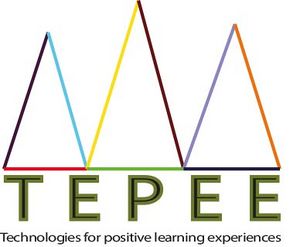« TEPEE » : différence entre les versions
Aucun résumé des modifications |
|||
| (27 versions intermédiaires par 3 utilisateurs non affichées) | |||
| Ligne 1 : | Ligne 1 : | ||
[[Fichier:Tepee_A4_avec_texte.jpg|bordure|droite|sans_cadre|lien=https://edutechwiki.unige.ch/fr/Fichier:Tepee_A4_avec_texte.jpg]]''' | [[Fichier:Tepee_A4_avec_texte.jpg|bordure|droite|sans_cadre|lien=https://edutechwiki.unige.ch/fr/Fichier:Tepee_A4_avec_texte.jpg]]'''TEPEE''' (Technologies for Positive Learning Experiences) is a research group led by Pr. Gaëlle Molinari, and jointly associated with [https://tecfa.unige.ch/fr/ TECFA] (Faculty of Psychology and Educational Sciences, University of Geneva) and UniDistance. TEPEE is a follow-up to a special issue for the journal STICEF entitled “Positive technologies for learning” ([http://sticef.univ-lemans.fr/classement/speciaux.htm#technopo Molinari et al., 2021]). Positive technologies for learning is an emerging line of research in the field of educational technologies which draws on different fields: psychology of emotions and its research on the role of emotions in learning; positive psychology, which is concerned with the scientific study of conditions and factors that promote individuals’ well-being and the development of their full potential; and positive technologies that focuses on the design and use of digital technologies to support the optimal functioning of individuals, groups, and organizations. | ||
The TEPEE research is organized around two interdependent axes, one related to teaching (Axis 1) and the other to learning (Axis 2). In Axis 1, we are interested in the use of digital technologies by teachers in the classroom and how this can influence emotions, motivational beliefs and teacher well-being. Axis 2 is organized into two sub-themes. The first (Axis 2.1) is devoted to understanding how to enhance the student learning experience in hybrid or fully remote environments, including how to help students engage and persevere, cope with the pressure of self-regulation and fluctuations in emotions and motivation. The second (Axis 2.2) focuses on computer-supported collaborative learning (CSCL) and its emotional and motivational dimensions. The objective is to understand the complex role of emotions and their regulation in hybrid/remote collaborative learning environments, in particular how to help students become aware of the emotions felt during group work and how to use them to better collaborate. | |||
* | '''Les membres du groupe TEPEE''' | ||
==== Coordinator ==== | |||
*[[Fichier:Gaëlle Molinari, professeure assistante .png|vignette|150x150px|Gaëlle Molinari]]'''Gaëlle Molinari''' (you can access [[Utilisateur:Gaëlle Molinari|her CV here]]). | |||
==== Research and teaching assistant ==== | |||
*'''Djamileh Aminian''' (TECFA, MALTT). [https://drive.google.com/file/d/1OXs3sjMT6p5kgMDGECMzUMMA11JXavBY/view?usp=share_link I doubt, therefore I learn. How to use confusion to foster deeper learning and students’ confidence in online learning environments]. (Master soutenu en 2022. | |||
==== Predoctoral researchers ==== | |||
[[Fichier:Yannick Nleme 2022.jpg|alt=|vignette|150x150px|Yannick S. Nleme Ze]] | |||
* '''[https://orcid.org/0000-0001-8212-678X Yannick Stéphane Nleme Ze]'''. Students' engagement in MOOC forums. | |||
* ''' | |||
* | * | ||
* | * | ||
* | * | ||
*[[Fichier:Cécile Vassaux.jpg|vignette|150x150px|Cécile Vassaux]]'''Cécile Vassaux.''' | *[[Fichier:Cécile Vassaux.jpg|vignette|150x150px|Cécile Vassaux]]'''Cécile Vassaux'''. Teachers' well-being with digital technologies. | ||
* | *'''Nathalie Borgognon'''. Exploring phygital continuity for collaborative making and learning in FacLabs. | ||
* | *'''Priçulla Trouillefou'''. Relationship between group flow and collective intelligence. | ||
*( | |||
*''' | ==== Master students ==== | ||
'' | *[[Fichier:Djamileh Aminian.jpg|vignette|199x199px|Djamileh Aminian]]'''Yong Xin Lam''' (TECFA, MALTT). Promoting gender equality in computer science education. | ||
*''' | *'''Marie Guillon''' (TECFA, MALTT). Group Awareness Tool for Self-Assessment and Visualization of Participation: Its effect on the Regulation of Unequal Participation (ICLS paper). | ||
*'''Stéphanie Doriot''' (UniDistance | *'''Nicolas Hervy''' (TECFA, MALTT). [[Investigation de l’expression de l’impulsivité selon le profil procrastinateur et pistes de remédiation|Study of the expression of impulsivity according to the procrastinator's profile and the possibilities of remediation]]. | ||
*''' | *'''Anne-Lise Bouscail''' (TECFA, MALTT). Citizen science projects for seniors. | ||
*'''Chloé Raynal''' (Faculté de Psychologie, UniDistance). Emotions in peer assessment. | |||
==== Alumni ==== | |||
*'''Predoctoral researchers''' | |||
**'''Sunny Avry''' (TECFA). [https://archive-ouverte.unige.ch/unige:149507 Beyond the Dichotomy between the Socio-cognitive and Socio-emotional Spaces: the Pervasive Role of Emotions in Collaborative Problem-Solving]. Soutenue en 2021. | |||
*'''Master students''' | |||
**'''Stéphanie Doriot''' (UniDistance). [https://drive.google.com/file/d/1b3wxw4qB3wSY5GyUI1Vuk0I8odjenayr/view?usp=share_link Effets d’une intervention d’apprentissage collaboratif et créatif et d’une intervention de journal réflexif sur le bien-être et l’orientation reconnaissante]. Soutenu en 2022. | |||
**'''Pastora Garcia Garcia''' (TECFA, MALTT). [https://archive-ouverte.unige.ch/unige:157242 DYPPEE (Dynamic Prism for Positive Educational Experience) : un cadre théorique illustré par l'expérience d'étudiant-es dans une formation universitaire innovante à visée professionnalisante]. Soutenu en 2021. | |||
Dernière version du 6 avril 2023 à 19:24
TEPEE (Technologies for Positive Learning Experiences) is a research group led by Pr. Gaëlle Molinari, and jointly associated with TECFA (Faculty of Psychology and Educational Sciences, University of Geneva) and UniDistance. TEPEE is a follow-up to a special issue for the journal STICEF entitled “Positive technologies for learning” (Molinari et al., 2021). Positive technologies for learning is an emerging line of research in the field of educational technologies which draws on different fields: psychology of emotions and its research on the role of emotions in learning; positive psychology, which is concerned with the scientific study of conditions and factors that promote individuals’ well-being and the development of their full potential; and positive technologies that focuses on the design and use of digital technologies to support the optimal functioning of individuals, groups, and organizations.
The TEPEE research is organized around two interdependent axes, one related to teaching (Axis 1) and the other to learning (Axis 2). In Axis 1, we are interested in the use of digital technologies by teachers in the classroom and how this can influence emotions, motivational beliefs and teacher well-being. Axis 2 is organized into two sub-themes. The first (Axis 2.1) is devoted to understanding how to enhance the student learning experience in hybrid or fully remote environments, including how to help students engage and persevere, cope with the pressure of self-regulation and fluctuations in emotions and motivation. The second (Axis 2.2) focuses on computer-supported collaborative learning (CSCL) and its emotional and motivational dimensions. The objective is to understand the complex role of emotions and their regulation in hybrid/remote collaborative learning environments, in particular how to help students become aware of the emotions felt during group work and how to use them to better collaborate.
Les membres du groupe TEPEE
Coordinator
- Gaëlle Molinari (you can access her CV here).
Research and teaching assistant
- Djamileh Aminian (TECFA, MALTT). I doubt, therefore I learn. How to use confusion to foster deeper learning and students’ confidence in online learning environments. (Master soutenu en 2022.
Predoctoral researchers
- Yannick Stéphane Nleme Ze. Students' engagement in MOOC forums.
- Cécile Vassaux. Teachers' well-being with digital technologies.
- Nathalie Borgognon. Exploring phygital continuity for collaborative making and learning in FacLabs.
- Priçulla Trouillefou. Relationship between group flow and collective intelligence.
Master students
- Yong Xin Lam (TECFA, MALTT). Promoting gender equality in computer science education.
- Marie Guillon (TECFA, MALTT). Group Awareness Tool for Self-Assessment and Visualization of Participation: Its effect on the Regulation of Unequal Participation (ICLS paper).
- Nicolas Hervy (TECFA, MALTT). Study of the expression of impulsivity according to the procrastinator's profile and the possibilities of remediation.
- Anne-Lise Bouscail (TECFA, MALTT). Citizen science projects for seniors.
- Chloé Raynal (Faculté de Psychologie, UniDistance). Emotions in peer assessment.
Alumni
- Predoctoral researchers
- Sunny Avry (TECFA). Beyond the Dichotomy between the Socio-cognitive and Socio-emotional Spaces: the Pervasive Role of Emotions in Collaborative Problem-Solving. Soutenue en 2021.
- Master students
- Stéphanie Doriot (UniDistance). Effets d’une intervention d’apprentissage collaboratif et créatif et d’une intervention de journal réflexif sur le bien-être et l’orientation reconnaissante. Soutenu en 2022.
- Pastora Garcia Garcia (TECFA, MALTT). DYPPEE (Dynamic Prism for Positive Educational Experience) : un cadre théorique illustré par l'expérience d'étudiant-es dans une formation universitaire innovante à visée professionnalisante. Soutenu en 2021.




